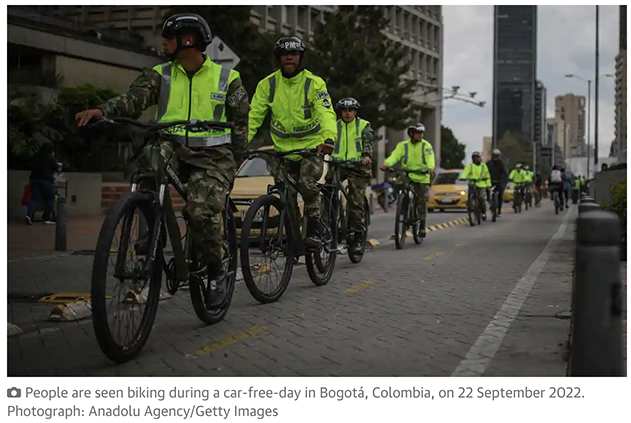
Colombia announces halt on fossil fuel exploration for a greener economy
Por: Luke Taylor | 20 de enero 2023
The minister for mines, Irene Vélez, told world leaders the country will shift away from fossil fuels to begin a sustainable chapter

Colombia’s leftwing government has announced that it will not approve any new oil and gas exploration projects as it seeks to shift away from fossil fuels and toward a new sustainable economy.
Irene Vélez, the minister for mines told world leaders at the World Economic Forum in Davos that the time had come for the Andean nation to move away from its reliance on oil and gas and begin a new, greener chapter in the country’s history.
“We have decided not to award new oil and gas exploration contracts, and while that has been very controversial, it’s a clear sign of our commitment in the fight against climate change,” Vélez said during a panel in Davos on Thursday. “This decision is absolutely urgent and needs immediate action.”
Colombia’s president, Gustavo Petro, made ending the country’s long history of economic reliance on oil a key part of his campaign before becoming the country’s first leftist leader in August last year.
But a fractured congress, increasingly bleak economic outlook and a series of policy U-turns from the government have put Petro’s ambitious environmentally friendly pledge in doubt.
The country’s finance minister, José Ocampo, has stepped in on several occasions to contradict government ministers and reassure financial markets after their comments sent the value of the Colombian peso tumbling.
Ocampo has repeatedly told reporters that the country remains open to new oil and gas projects as it relies heavily on the sector’s revenue.
But Petro backed Vélez’s announcement this week, saying that alternative economies would make up the loss from oil, which accounts for around half of all of Colombia’s total export revenue.
“We are convinced that strong investment in tourism, given the beauty of the country, and the capacity and potential that the country has to generate clean energy, could, in the short term, perfectly fill the void left by fossil fuels,” Petro told reporters in Davos.
Vélez’s doubling down on the policy has been met with criticism from economic analysts who say that halting oil exploration will not affect the global demand for fossil fuels while hurting Colombia’s economy.
Colombia should transition toward clean energy but without “killing its golden-egg-laying goose”, Julio César Vera, former president of the Colombian Association of Petroleum Engineers, told Colombian media.
The policy has also been criticised by environmental experts who say the move does not address the country’s key environmental issues, such as cattle-ranching and unsustainable agriculture which are driving deforestation in the Amazon rainforest, nor will it have any significant effect on the global climate crisis.
“Colombia must not sacrifice its economic growth to make itself the champion of energy transition in Latin America,” said Manuel Rodríguez, who in 1991 became the country’s first environment minister.
“This is a childish and populist idea based on a false narrative because according to the studies, we will lose several points of GDP while making next to no effect on the global consumption of fossil fuels. Another oil-producing country will simply make up for Colombia’s shortfall.”
… as 2023 gathers pace, and you’re joining us from Colombia, we have a small favour to ask. A new year means new opportunities, and we’re hoping this year gives rise to some much-needed stability and progress. Whatever happens, the Guardian will be there, providing clarity and fearless, independent reporting from around the world, 24/7.
Times are tough, and we know not everyone is in a position to pay for news. But as we’re reader-funded, we rely on the ongoing generosity of those who can afford it. This vital support means millions can continue to read reliable reporting on the events shaping our world. Will you invest in the Guardian this year?
Unlike many others, we have no billionaire owner, meaning we can fearlessly chase the truth and report it with integrity. 2023 will be no different; we will work with trademark determination and passion to bring you journalism that’s always free from commercial or political interference. No one edits our editor or diverts our attention from what’s most important.
With your support, we’ll continue to keep Guardian journalism open and free for everyone to read. When access to information is made equal, greater numbers of people can understand global events and their impact on people and communities. Together, we can demand better from the powerful and fight for democracy.